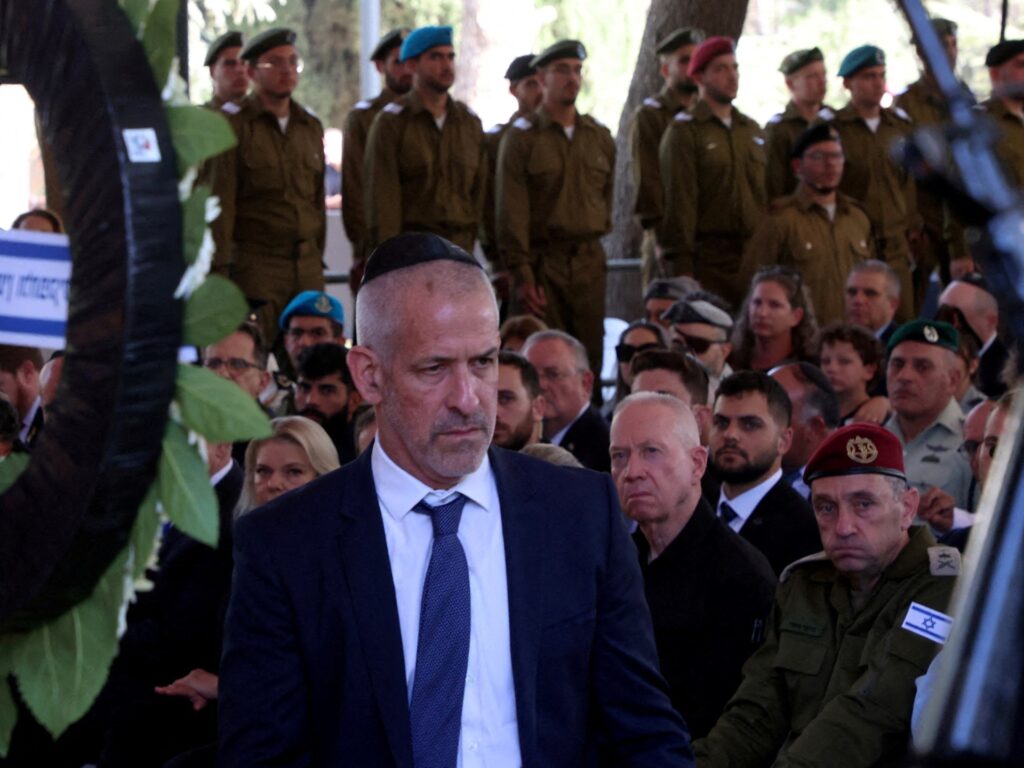Trump says he will be speaking with Russian President Vladimir Putin on Tuesday

President Donald Trump said he will likely be speaking with Russian President Vladimir Putin on Tuesday while speaking with reporters on Air Force One Sunday night. The president was returning to Washington, D.C., from Florida when he told the reporters of the upcoming discussion. “We will see if we have something to announce maybe by Tuesday,” Trump said, sharing that the possibility of divvying up land, power plants and other assets has been discussed in an attempt to end Russia’s war in Ukraine. This is a breaking news story. Check back for updates.
Orry aka Orhan Awatramani among others booked by J-K police for consuming alcohol in Katra

At least eight individuals, including Orhan Awatramani were booked for violating local laws in Katra, Jammu division.
Christian Menefee, top civil attorney for Harris County government, files for Sylvester Turner’s congressional seat

The district has been a Democratic stronghold, held for decades by Sheila Jackson Lee and most recently by former Houston Mayor Sylvester Turner, who died March 5.
Ayodhya’s Ram Janmabhoomi Trust paid whopping tax of Rs…; 1.26 crore devotees visited city during Maha Kumbh

The tax was paid in 5 years between February 5, 2020 and February 5, 2025.
Barcelona come back at Atletico Madrid to claim LaLiga top spot

Ferran Torres scores twice as Barcelona come from two down to beat Atletico Madrid and claim top spot in LaLiga. Barcelona battled back from two goals down to beat Atletico Madrid 4-2 and land an important blow in the Spanish title race. Lamine Yamal struck in the 92nd minute and Ferran Torres in the 98th to help take the Catalans back to the top of the table on Sunday, after Real Madrid beat Villarreal on Saturday to briefly claim pole position. Barcelona have a game in hand on the champions, with both sides level on 60 points, while Atletico trail the top two by four after they crumbled at home against Hansi Flick’s side to end a disastrous week following their Champions League elimination. Barcelona’s Ferran Torres scores their fourth goal [Juan Medina/Reuters] Having twice been caught out late by Atletico this season, this time it was Barcelona’s turn to provide the sting in the tail, extending their unbeaten streak to 18 matches across all competitions. Julian Alvarez and Alexander Sorloth put Atletico ahead before Robert Lewandowski and Torres hit back for Barca, who went on to win in stoppage time. Flick selected Marc Casado in midfield, with Frenkie de Jong not fit enough to be included in the match-day squad. Advertisement The German had warned his players to stay focused after they conceded a 96th-minute goal in December to surrender the lead at the top of the table to Atletico in a 2-1 home defeat. Barcelona also conceded two late goals in the Copa del Rey semifinal first leg to draw 4-4 against Diego Simeone’s side in February. They played within themselves in the first half, overly cautious and conserving energy, failing to create many openings. Teenage winger Yamal created one for himself but fired wide with Jan Oblak’s goal gaping, while Lewandowski directed a header at the Slovenian stopper. At the other end, Atletico wanted a penalty when Inigo Martinez pulled back Marcos Llorente in the area, but they were not given it. Barcelona’s best chance of the first half came when Pedri played in Lewandowski, who hit the top of the crossbar with a powerful drive. From the resulting goal kick, Atletico found the opener. Julian Alvarez of Atletico de Madrid scores his team’s first goal past Wojciech Szczesny of Barcelona [Angel Martinez/Getty Images] The hosts worked the ball to Griezmann, who threaded a brilliant pass across the area to Giuliano Simeone, with Alvarez finishing from his cut-back. It provided a moment of joy for the former Manchester City striker who felt deep frustration in midweek when his penalty against Real Madrid was controversially disallowed for a supposed double touch on the ball, as Atletico were eliminated in the Champions League last 16 on Wednesday. Yamal probed after the break as Barca looked for a way back in, and Simeone turned to his bench to freshen up his side who had played 120 draining minutes against Los Blancos. Advertisement The coach introduced Sorloth and Conor Gallagher and they combined for Atletico’s second goal. Atletico put together another fine team move with Griezmann heavily involved, before Gallagher squared to perennial super-sub Sorloth to net his 11th league goal of the season, despite just nine starts. Atletico Madrid’s Alexander Sorloth celebrates scoring their second goal with Antoine Griezmann [Juan Medina/Reuters] Barcelona had complaints about a Rodrigo De Paul handball in the build-up being dismissed and they turned their anger into an instant response. Martinez drove forward with the ball and slung it into the box for Lewandowski, who controlled well and powered a low finish past Oblak to spark the comeback. Substitute Torres netted the equaliser when Raphinha, on an otherwise quiet night in the capital for the Brazilian, crossed from the right. With Atletico shaken, Barcelona took full advantage, with Yamal’s deflected shot from distance sending them ahead in stoppage time. Torres bagged his second late on to round off a win which could prove decisive come the end of the season. Barcelona’s Lamine Yamal celebrates scoring their third goal with teammates [Susana Vera/Reuters] Adblock test (Why?)
White House blasts judge for attempting to halt deportation flights to El Salvador: ‘No lawful basis’

The White House criticized a federal judge’s attempt to halt the Trump administration’s recent deportation flights, a move that was deemed “too late” by the Central American leader who accepted the deportations over the weekend. On Friday, President Donald Trump invoked the Alien Enemies Act of 1798, which allows deportation of natives and citizens of an enemy nation without a hearing. The act had only been successfully invoked three times in U.S. history: during the War of 1812, World War I and World War II. U.S. District Judge James Boasberg recently ordered an immediate stop to the deportations in order to determine whether Trump’s invocation of the 1798 act was legal – but a Trump administration official told Fox News that the planes carrying the migrants had already left U.S. airspace when the judge issued his order. In a statement to Fox News on Sunday, White House Press Secretary Karoline Leavitt said that the Trump administration “did not ‘refuse to comply’ with a court order.” EL SALVADOR AGREES TO ACCEPT US DEPORTEES OF ANY NATIONALITY FOLLOWING MEETING WITH RUBIO “The order, which had no lawful basis, was issued after terrorist [Tren de Aragua] aliens had already been removed from U.S. territory,” Leavitt said. “The written order and the Administration’s actions do not conflict.” “Moreover, as the Supreme Court has repeatedly made clear – federal courts generally have no jurisdiction over the President’s conduct of foreign affairs, his authorities under the Alien Enemies Act, and his core Article II powers to remove foreign alien terrorists from U.S. soil and repel a declared invasion,” Leavitt added. “A single judge in a single city cannot direct the movements of an aircraft carrier full of foreign alien terrorists who were physically expelled from U.S. soil.” RUBIO HEADS TO PANAMA, LATIN AMERICA TO PURSUE TRUMP’S ‘GOLDEN AGE’ AGENDA On Sunday, El Salvador President Nayib Bukele responded to Boasberg’s order by joking, “Oopsie… too late,” in an X post. He also shared footage of heavily-armed Salvadorean authorities escorting the alleged gang members off the planes, shaving their heads and rounding them up in their prison cells. A total of 261 illegal aliens were deported from the U.S. to El Salvador yesterday – 137 of which were through the Alien Enemies Act of 1798, 101 others were Venezuelans removed via Title 8 and another 21 were Salvadoran MS-13 gang members. Two others were MS-13 ringleaders and “special cases” for El Salvador. A senior Trump administration official confirmed the numbers to Fox News on Sunday, explaining that the migrants’ alleged crimes included kidnapping, sexual abuse of a child, aggravated assault, prostitution, robbery and aggravated assault of a police officer. Fox News Digital’s Emma Colton contributed to this report.
Trumps takes jab at Biden over ‘autopen signature’ following concerning report over who ran the White House

President Donald Trump trolled former President Joe Biden in a social media post on Sunday, highlighting the controversy surrounding his alleged “autopen signatures” during his presidency. On Truth Social, Trump posted three images side-by-side – his official portrait from his first term, a picture of Biden’s autopen and then finally his official portrait for his second term. Trump then pinned the post. “The person who was the real President during the Biden years was the person who controlled the Autopen!” Trump wrote in another post on his account. BIDEN’S ‘AUTOPEN SIGNATURE’ APPEARS ON MOST OFFICIAL DOCS, RAISING CONCERNS OVER WHO CONTROLLED THE WH: REPORT Trump spoke about the autopen signature issue while speaking from the Oval Office on Friday about NATO spending. “The man was grossly incompetent. All you have to do is take a look, he signs by autopen. Who was signing all this stuff by autopen? Who would think to sign important documents by autopen?” Trump asked reporters. “These are major documents you’re signing, you’re proud to sign, yet you have your signature on something and in 300 years, they say ‘oh look.’ Can you imagine everything was signing by autopen? Almost everything. Nobody has ever heard of such a thing. It should have never happened,” Trump continued. The post sparked a firestorm on social media with many backing Trump as Democrats have faced backlash over accusations that they dismissed Biden’s health concerns and engaged in a cover-up throughout the end of his term. “President Trump JUST POSTED the AUTOPEN that ran the White House from 2021-2025 next to his portraits,” one X user commented. LIES ABOUT BIDEN’S AGE, HEALTH DURING HIS PRESIDENCY IS A ‘SCANDAL OF EPIC PROPORTIONS,’ SCOTT JENNINGS SAYS “Biden was an illegitimate president. Who controlled the auto pen?” another X used commented. Vice President JD Vance also shared the image on X without any comment. “Corrupt establishment was running the country from 2021-2025. Who controlled the auto pen for Biden?” Missouri Lieutenant Governor David Wasinger commented, sharing Vance’s post. Elon Musk also chimed in on the photo, posting on X, with two emojis – a bullseye and laughing face. Fox News Digital reached out to Biden’s team about Trump’s post featuring the autopen image, but did not receive a response. In a new report published by an arm of the Heritage Foundation, it was revealed that the majority of official documents signed by Biden allegedly used the same autopen signature, reinvigorating concerns over the former president’s mental acuity and if he “actually ordered the signature of relevant legal documents.” “WHOEVER CONTROLLED THE AUTOPEN CONTROLLED THE PRESIDENCY,” the Oversight Project, which is an initiative within the conservative Heritage Foundation that investigates the government to bolster transparency, posted to X on Thursday. CHUCK SCHUMER CONFRONTED WITH OLD CLIP OF HIMSELF DECLARING BIDEN’S DECLINE ‘RIGHT-WING PROPAGANDA’ “We gathered every document we could find with Biden’s signature over the course of his presidency. All used the same autopen signature except for the announcement that the former President was dropping out of the race last year. Here is the autopen signature,” the group claimed on X, accompanied by photo examples. The Oversight Project posted three examples showing Biden’s signature, including two executive orders and the president’s announcement he was bowing out of the 2024 presidential race. The signature on the two executive orders, one of which was signed in 2022 and the other in 2024, showed the same signature that included what appeared to be a line, followed by “R. Biden Jr.” Fox News Digital reached out to Biden’s office for comment on the Oversight Project’s findings on the autopen investigation, but did not immediately receive a reply. Fox News Digital also examined the signatures on President Donald Trump’s executive orders, which are often signed in public or in front of the media, during his first administration and second administration and found the signatures were also the same. The Oversight Project continued in its findings that investigators should determine “who controlled the autopen” during the Biden administration. Fox News Digital’s Emma Colton contributed to this report.
Trump thanks El Salvador for taking in alleged gang members deported from US: ‘We will not forget’

President Donald Trump thanked El Salvador on Sunday after the country’s president shared dramatic video of hundreds of alleged migrant criminals landing in Central America after being deported from the U.S. Trump, who recently invoked the Alien Enemies Act of 1798, which allows the deportation of natives and citizens of an enemy nation without a hearing, thanked Nayib Bukele on social media. “Thank you to El Salvador and, in particular, President Bukele, for your understanding of this horrible situation, which was allowed to happen to the United States because of incompetent Democrat leadership,” Trump wrote. “We will not forget!” Trump also referred to the apprehended migrants as “the monsters sent into our Country by Crooked Joe Biden and the Radical Left Democrats.” EL SALVADOR AGREES TO ACCEPT US DEPORTEES OF ANY NATIONALITY FOLLOWING MEETING WITH RUBIO A senior Trump administration official confirmed to Fox News that a total of 261 illegal aliens were deported to El Salvador yesterday – 137 were via the Alien Enemies Act of 1798, 101 were Venezuelans removed via Title 8, 21 were Salvadoran MS-13 gang members and two were MS-13 ringleaders and “special cases” for El Salvador, according to the official. The rap sheets for those removed included kidnapping, sexual abuse of a child, aggravated assault, prostitution, robbery and aggravated assault of a police officer. A Trump administration official also confirmed to Fox News that the planes carrying the migrants were already outside of U.S. airspace when a federal judge ordered the planes to return. U.S. District Judge James Boasberg ordered an immediate stop to Trump’s efforts to deport the alleged gang members so he could have more time to consider if Trump’s use of the Alien Enemies Act was illegal. “We did not defy a court order. The order came too late, and illegals were already in international airspace,” the official said, as first reported by Axios. White House Press Secretary Karoline Leavitt echoed the official’s sentiment, telling Fox News that the order “had no lawful basis, was issued after terrorist [Tren de Aragua] aliens had already been removed from U.S. territory.” “The written order and the Administration’s actions do not conflict,” Leavitt said. “A single judge in a single city cannot direct the movements of an aircraft carrier full of foreign alien terrorists who were physically expelled from U.S. soil.” In an X post, Bukele said the migrants arrived in El Salvador and were transferred to a “terrorism confinement center,” where they will stay for at least a year. The intense video showed heavily-armed Salvadorean authorities surrounding the alleged gang members, forcing their heads down and transporting them into facilities one by one. RUBIO HEADS TO PANAMA, LATIN AMERICA TO PURSUE TRUMP’S ‘GOLDEN AGE’ AGENDA The video also depicted the suspects getting their hair shaven and walking with their hands behind their necks as they were rounded up into their prison cells. “Over time, these actions, combined with the production already being generated by more than 40,000 inmates engaged in various workshops and labor under the Zero Idleness program, will help make our prison system self-sustainable,” Bukele wrote. “As of today, it costs $200 million per year.” He also said that the apprehension of the MS-13 members “will help us finalize intelligence gathering and go after the last remnants of MS-13, including its former and new members, money, weapons, drugs, hideouts, collaborators, and sponsors.” “As always, we continue advancing in the fight against organized crime,” he added. “But this time, we are also helping our allies, making our prison system self-sustainable, and obtaining vital intelligence to make our country an even safer place. All in a single action.” “May God bless El Salvador, and may God bless the United States.” Bukele’s post was also warmly received by Secretary of State Marco Rubio, who thanked the Salvadorean leader for his “assistance and friendship.” “President @nayibbukele is not only the strongest security leader in our region, he’s also a great friend of the U.S.,” Rubio said in an X post. “Thank you!” Fox News Digital’s Brooke Curto and Kyle Schmidbauer contributed to this report.
Netanyahu moves to dismiss head of Shin Bet over lack of ‘trust’

Israeli Prime Minister Netanyahu says he no longer has ‘trust’ in the head of the domestic security agency. Israeli Prime Minister Benjamin Netanyahu will bring a vote to the government to dismiss the director of the Shin Bet domestic security service. In a statement from Netanyahu’s office on Sunday, the prime minister said he has had an “ongoing distrust” for Ronen Bar and that trust in the head of the domestic security service is crucial at a time of war. According to Israeli media, the vote to dismiss the Shin Bet chief is expected to take place in a special cabinet meeting on Wednesday. But in a statement, Bar said while he took “responsibility for the agency’s part” in failing to prevent the October 7 2023, Hamas attack that sparked the war in Gaza, it was “clear that the intent behind my dismissal is not related” to it. “The prime minister’s expectation of a personal loyalty that contradicts the public interest is an entirely improper expectation,” Bar said. Israeli Democrat Party chief Yair Golan also slammed the move to dismiss Bar and wrote on X that “Netanyahu declared war on the State of Israel.” Advertisement “The dismissal of the head of the Shin Bet is a desperate attempt by a criminal defendant to get rid of someone who is loyal to Israel and who is investigating Netanyahu and his close circle for serious and dark offences and is not willing to whitewash them,” Golan said. “The dismissal of the head of the Shin Bet will not pass as if nothing happened. There will be tremendous resistance, we will fight with force and will not allow Netanyahu to turn the State of Israel into a dictatorship of a corrupt man,” he added. The decision to dismiss Bar comes after an angry dispute between the two, which focused on who bears responsibility for October 7. The Shin Bet, which is responsible for monitoring Palestinian armed groups, recently issued a report accepting responsibility for its failures in the attack, which is seen in Israel as the country’s worst security failure that led to its single deadliest day, with 1,200 people killed and 251 taken captive, according to an Israeli tally. However, the organisation also criticised Netanyahu for failed government policies that helped create the moment that led to the attack. Still, the prime minister has also resisted calls for an official state commission inquiry into the events of October 7. Moreover, the decision to dismiss Bar follows several senior Israeli officials who were in charge during the Hamas attack being forced to step down, including former Defence Minister Yoav Gallant and army chief Lieutenant General Herzi Halevi. The tensions boiled over this weekend when Bar’s predecessor, Nadav Argaman, said he would release sensitive information about Netanyahu if it is found that the prime minister had broken the law. Advertisement Netanyahu accused Argaman of blackmail and filed a police complaint. Adblock test (Why?)
First photo of ailing Pope Francis released amid complex health condition

The pontiff, 88, continues papal duties despite ill health, approving long-term church reform from his hospital room. The Vatican has released the first picture of Pope Francis since the 88-year-old was admitted to hospital last month for double pneumonia. The picture, published on Sunday, shows Francis from behind, facing an altar after celebrating mass in a chapel at the hospital. The pope entered Rome’s Gemelli Hospital on February 14 with a severe respiratory infection that has required evolving treatment. He has not been seen in public since. The pontiff, who has been receiving oxygen throughout his treatment, appears to be breathing on his own in the photo. Journalists and the faithful have been asking for images of the pope as the last image of Francis was published more than a month ago, a Vatican News report said. Since being hospitalised, the only other sign of the pope has been audio released on March 6 where a fatigued Francis could be heard thanking all those who have been praying for his recovery. Concerning his health, “the situation remains stable” the report said, but still within a “complex clinical picture”. Advertisement Doctors this week said Francis was no longer in critical, life-threatening condition. But they have continued to emphasise that his condition remained complex due to his age, lack of mobility and the loss of part of a lung as a young man. Still, the pope has continued performing his duties. On Saturday, he approved a three-year implementation and evaluation process for a reform project that aims to make the Roman Catholic Church more welcoming and responsive. The Vatican office for the Synod of Bishops released a timetable through 2028 to implement the reforms and said Francis had approved the calendar last week. Adblock test (Why?)
